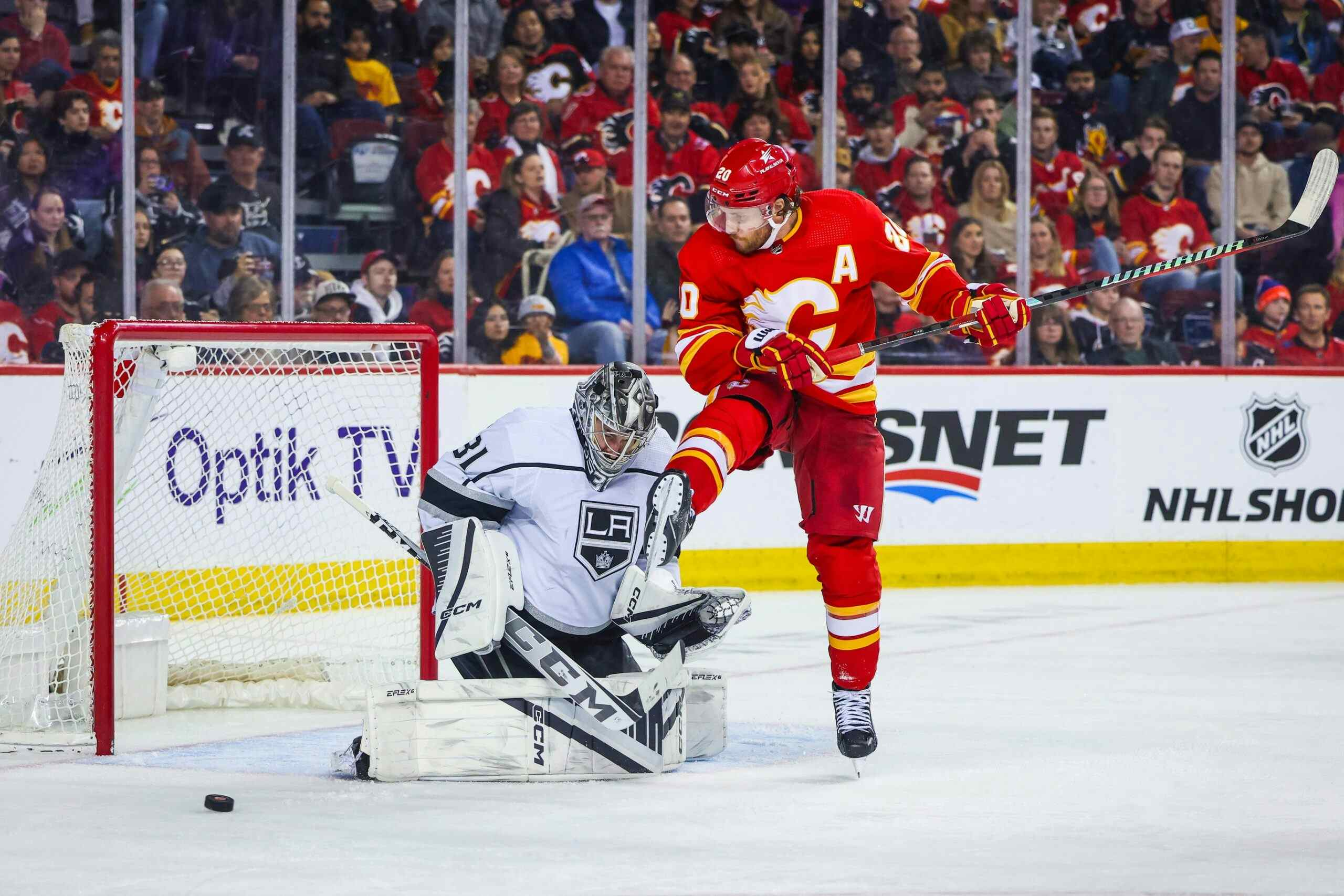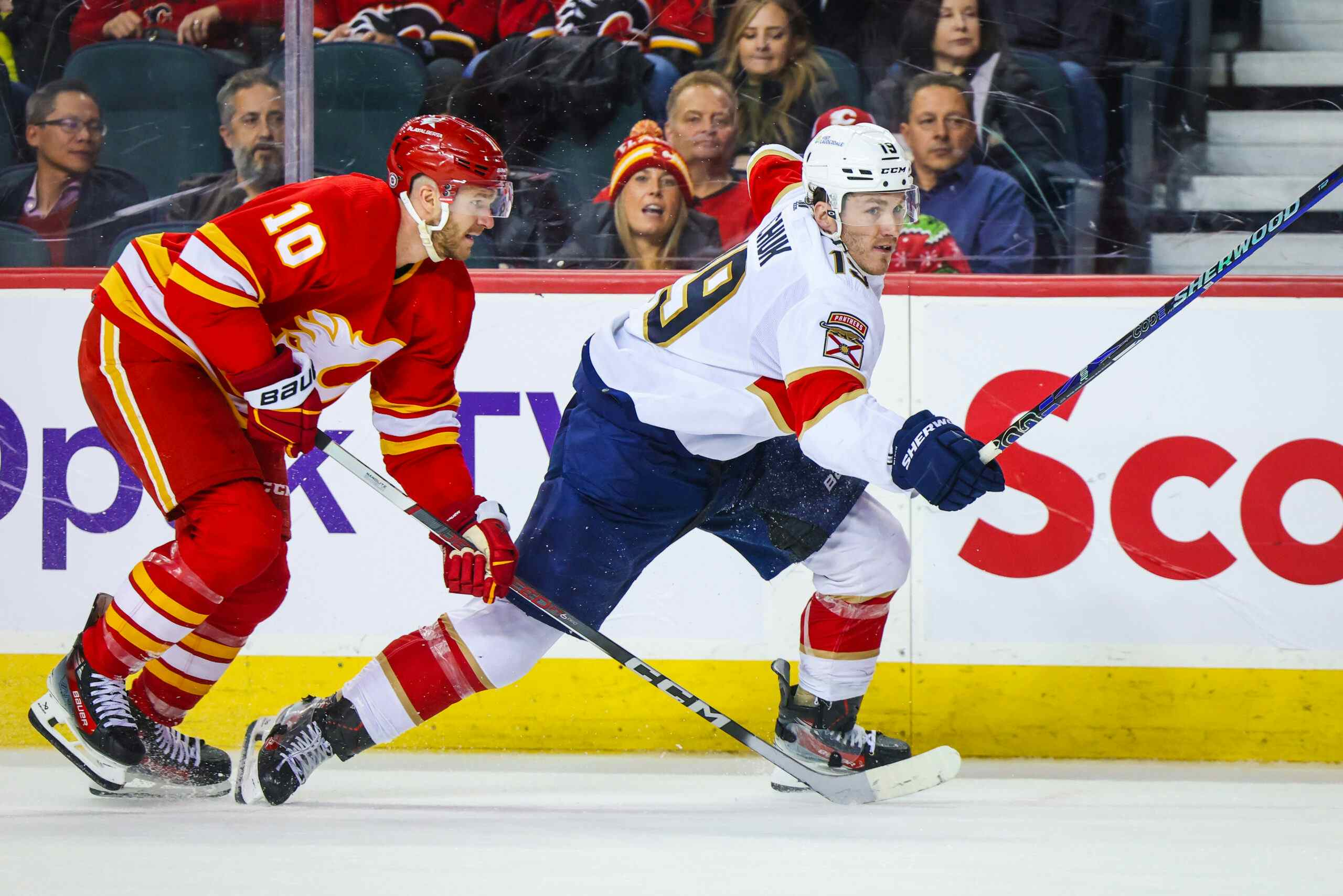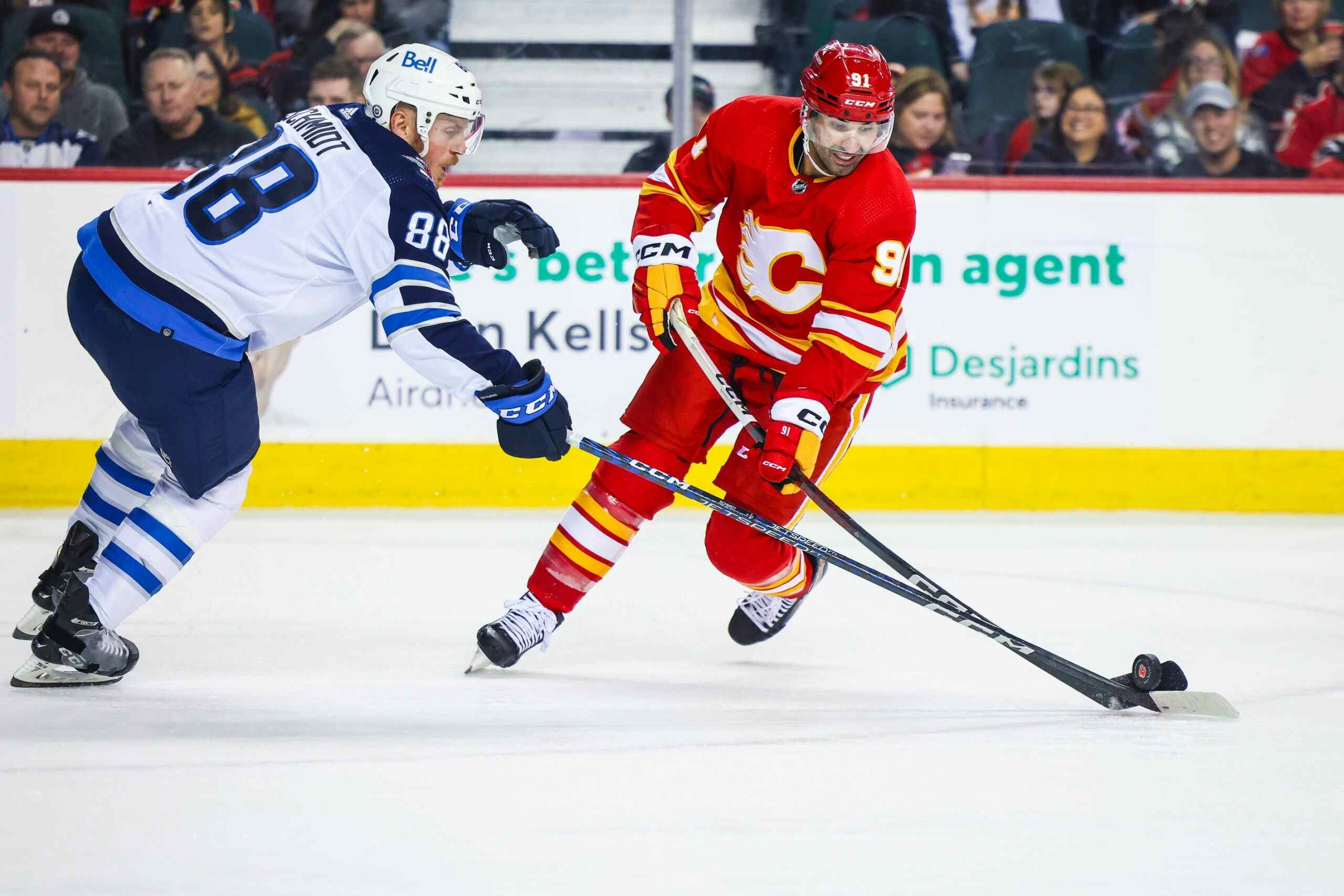Where it all went horribly wrong
By Ryan Lambert
14 years ago
I’ve conceived and rejected about 50 different ways to construct this season in review. But, unlike Darryl Sutter’s plan headed into the season, I didn’t decide to simply start it without really having a good idea in mind.
The most logical place to start, I suppose, would be the beginning: June 27, 2009.
Prologue: The Age of Innocence
I was on a golf course, about to tee off for the first time since junior high, when I got the text from a friend of mine. "Get excited, buddy. The Flames traded Leopold and a third for the rights to negotiate with Jay Bouwmeester." I wasn’t even on the first green and I was fistpumping like Tiger Woods (construe that simile any way you like).
This was the most sought-after free agent defenseman in years, and coming off a season in which Calgary had the 21st-ranked team defense in the league, I figured that was a good thing. After my nine-hole slog (I hit about 14 over, thanks), I was checking Twitter and I also saw that Jim Vandermeer got traded to Phoenix. Bouwmeester AND a salary dump in the same day? I quickly forgot the four-putt on 7. This, it seemed, was Darryl Sutter at his shrewdest.
But by July 1, the magic had run out as quickly as the Flames’ cap space. The signings in the immediate aftermath of the free agent cattle call’s start were, shall we say, underwhelming. Freddy Sjostrom, Garth Murray, Riley Armstrong, Staffan Kronwall, Jason Jaffray, and Brian McGrattan all signed by July 11, but Flames fans "got it." Sure it was going to be a top-heavy roster — most Cup contenders are adept at finding diamonds in the rough and turning them into minor stars in their own right — but look at how good that top was!
Jarome Iginla, one of the premier wings in the NHL even at 31 years old, coming off 89-point season. A defensive troika of Canadian Olympic Team probables in Bouwmeester, Robyn Regehr and Dion Phaneuf. And, hopefully, a Vezina-winning goalie rounding back into form. Led by a new coach that had as recently as a few months prior guided the New Jersey Devils to a 106-point season.
In Sutters Flames fans now trusted, and they had been given very little reason to find fault with the plan of attack for the new season.
They were, of course, dead wrong.
Chapter 1: The September issue
The cracks started to show early. Or at least they started to show as much as they could in preseason with gamenight rosters loaded up to 75 percent with AHL-level players. This was a team that couldn’t score. There were some noisy outputs against some "B" and even "C" squads, but when a team brought its NHL players, the Calgary offense quieted down faster than a substitute teacher’s classroom when the principal walks in.
Oh, but the preseason tells you very little about a team and blah blah blah. I get that, and that’s why I, along with everyone else, it seemed, wasn’t particularly bothered.
Then began Darryl Sutter’s incessant tinkering. After camp had wrapped but before the season began, he shipped Anton Stralman, a somewhat promising young offensive defenseman whom the Flames had gotten in the Wayne Primeau salary dump, and who had in my opinion earned a spot on the final D pairing, to Columbus for a third-round pick. While I was somewhat bothered by the deal, and the fact that it ensured Staffan Kronwall an opening-night roster spot, what was anyone going to say? Calgary still had the best team defense in the league. In Sutter we had to trust.
Of course, it proved symptomatic of a much, much larger problem: Sutter was never happy with this team.
Chapter 2: October sky
Calgary record to start the month: 0-0-0, 0 points
Status: Eager
Status: Eager
Over the years, the Flames have grown infamous for their slow starts, so when they ripped off four straight wins with 17 goals to show for it, everyone was pretty well chuffed. In fact, through their first 10 games, the Flames picked up 15 points and were second in the West on Oct. 24.
The offense, too, was positively humming along. The Flames had piled up 41 goals in just 10 games, tied for the league lead with the New York Rangers (of all teams) and allowed a worrying 33. But that worry was sure to be short-lived, right? The belief was that the defense was too good to not sort itself out, while the offense kept producing at a torrid pace. And, even if the defensive problems persisted, Sutter had acquired a steady if unspectacular bottom-pairing defenseman in Aaron Johnson for the bargain-basement price of Kyle Greentree.
Problem was, they ended the month with two straight home losses, one to a surprising Colorado team that had exploded out of the gate, and one to Detroit. In both games, the offense was ineffectual.
By Halloween, Calgary had slipped to seventh in a very tight Western Conference.
Chapter 3: November reign
Calgary record to start the month: 7-4-1, 15 points
Status: Edgy
Status: Edgy
The next morning, the Flames awoke to find themselves in eighth, though concern, at that point, hadn’t really crept in.
The two-game home losing streak gave way to what was sure to be a difficult stretch of two road games, a home game, then three more road games on both sides of both the continental divide and Mason-Dixon line. But the Flames emerged nearly unscathed, having left just one point from 12 on the table thanks to an overtime loss at white-hot Buffalo.
Two more troubling home losses — another to Colorado and a 7-1 steamrolling at the hands of the bogeymen from Chicago — were forgiven as easily as Calgary rolled over to concede them. Another run of two away, one home, three away saw the Flames yield the same result, 11 points from 12, to end the month.
Surely the Saddledome mailroom was receiving plaudits in quantities not seen since the swingin’ days of the Red Mile and Martin Gelinas’s bevy of series-winners. The Flames ended a month with 10 road games at 10-2-2, and were, for the second time this season, No. 2 in the West.
Chapter 4: The long December
Calgary record to start the month: 17-6-3, 37 points
Status: Invincible
Status: Invincible
Oh yes, this was the team we were promised back in July. The Flames had lost a grand total of one road game in regulation all season. A spectacular feat. Was there cause for concern in that 7-5-0 home record? Perhaps, but if they just kept above .500 in Calgary, they could probably even afford to slip a little bit when it came to games away from home.
That theory was soon put to the test.
Calgary had but six road games in December, and a spate of beatable opponents. If nothing else, they’d be able to take something like 18-20 points from their 14 games and still be in very solid shape headed into the new year. As it happened, 18 points was an unattainably high number. Calgary lost their first two road games outright since Oct. 13 in the span of four days, to Phoenix and Los Angeles, respectively. A three-point mini-homestand against Atlanta and Minnesota buoyed the hopes for a bounceback — after all, the other road game in that time was a win at the Shark Tank — but Calgary dropped their next two road games, to Colorado (again) and, disappointingly, 14th-in-the-West St. Louis.
Apart from the final three games of the year — at Edmonton, then hosting LA and Edmonton — all of which were gimme wins, Calgary won but three games of the other 11.
The defense had indeed rounded into form, having conceded 97 goals all season, good for sixth-best in the league, even after a rocky start. But the offense, as some feared it would, had vanished. Calgary scored just 28 goals in their 14 games in December. Their team offense was now 19th in the league and falling.
December’s record, an appalling 6-6-2 against some genuinely bad opponents, reflected the latter far more than the former.
Chapter 5: January jones
Calgary record to start the month: 23-12-5, 51 points
Status: Uneasy
Status: Uneasy
Even that three-game win streak at the end of December wasn’t enough to really boost anyone’s morale to the high-water marks of a month prior. A quick-and-easy win over Toronto on Jan. 2 marked the 41st game of the season, and Calgary was, as dubbed by the great Jean Lefebvre, "not too bad."
Damned by faint praise, really. Just 30 days prior, Calgary was 17-6-3 and seemed unstoppable. And Calgary had dropped lumps of holiday coal all over the place. Little did we know it was about to get much worse.
I’ll spare you the grislier details of the first month of what should have been a fresh start — a nine-game losing streak, losing 11 of 12, 31 goals for and 44 against, a 9-1 loss to San Jose, etc. etc. etc. — but suffice it to say Calgary fans were fiending for anything, anything at all, that would give them reason to believe in the team’s playoff chances.
Just a day after Calgary snapped its franchise-worst losing streak, Darryl Sutter dashed them for good.
Former Norris candidate and one-time Olympic hopeful Dion Phaneuf was shipped to Toronto, along Freddy Sjostrom and prospect Keith Aulie, for what amounted to spare parts for which Brian Burke no longer had any use. Enter the struggling Matt Stajan, the overpriced-and-signed-through-2012 Niklas Hagman, the mustachioed Ian White, and the what-is-he-doing-here Jamal Mayers as some sort of cure for what was ailing the Flames.
Perhaps Phaneuf did "have to go." Maybe the whispers of a blowout between he and Brent Sutter were true. Maybe his attitude was a divisive issue in the dressing room to the point it was affecting the on-ice product so terribly that he had to be shuttled out of town as soon as humanly possible. But I have to assume that Sutter could have gotten a better return than a bunch of middle-of-the-road castoffs from the 29th-best team in the league, because he would have to be an idiot otherwise.
Calgary finished the month 4-9-3, and with a considerably worse roster, and record, than when it began.
Chapter 6: February scars
Calgary record to start the month: 27-21-8, 62 points
Status: In a tailspin
Status: In a tailspin
The sledding didn’t get much easier in February. Calgary started the month with a loss, and, on Feb. 2, completed a deal that had been rumored for a few days. Olli Jokinen was out (yay!) and Ales Kotalik and Chris Higgins were in (…what?). It was Sutter’s second baffling move in a week, not so much because the player getting run out of town was particularly wanted, but because no one with even a rudimentary hockey knowledge would have brought in the players Sutter did.
Now you couldn’t swing a puck bag in the Flames dressing room without hitting a good four or five third-line wings masquerading as something more, all in the name of Sutter’s bizarre, quixotic mission to rid Calgary roster of all its so-called "cancers." But even if the team started promenading hand in hand through the Deerfoot Mall and sharing intimate meals in some upscale restaurants around town, the results needed to come, y’know, on the ice.
So when the Flames picked up their first back-to-back wins since Jan. 5, both of which came in the wake of the trade’s announcement (only the second tilt of that two-game shangri-la featured Kotalik and Higgins), little did we know that was to be the pre-Olympic high point. Calgary lost three of its next four before the league folded up tents for three weeks and jetted off for the unseasonably warmer climes of Vancouver.
The Olympics came and went, and only Jarome Iginla really had any kind of success, personal or otherwise, in that time. After a 3-3-1 month, was this renewed-and-improved Iggy going to lead Calgary back to home ice contention?
Chapter 7: Death March
Calgary record to start the month: 30-23-9, 69 points
Status: Oddly optimistic?
Status: Oddly optimistic?
For a little while, it seemed like it. Colorado was beginning to crater and Calgary actually looked almost like the team we saw in, say, October: not unstoppable, but not incompetent either. Hell, they won six of the first nine games they played, including an impressive four-game win streak against New Jersey, Minnesota, Detroit and Ottawa.
But the margin for error had become so narrow that any slip-up would surely spell the Flames’ doom. Flames fans and employees alike hoped that a relatively easy four-game stretch against Minnesota, Los Angeles, the New York Islanders and Boston Bruins (with the first, third and fourth being on the road) would give the team the boost it needed for the frantic final weeks of the season.
They, as ever, were wrong. Calgary lost to Minnesota in a shootout, beat Los Angeles in a manner just convincing enough to instill that pesky hope for a playoff berth, lost an oddly spiritless game to the woeful Isles, and got brutalized in Boston. And just like that, the season was over. Sure, they beat the Capitals and Coyotes as a kind of ha-ha-look-what-we-can-do-now-that-it-doesn’t-matter move to round out the month, but we’d the damage was done, and so were the 2009-10 Flames.
They ended the month with a 9-6-0 record, but it just wasn’t good enough.
Chapter 8: Miss April
Calgary record to start the month: 39-29-9, 62 points
Status: Devastated
Status: Devastated
By some miracle, Calgary actually had two games that kinda mattered here. If Colorado did especially poorly, and Calgary got six or seven points from its four April dates, it could sneak into the playoffs and, to some extent, lessen the pain this season had brought.
And, by some further miracle, they actually beat the Avalanche in their final head-to-head match up to keep hope alive just a short while longer. The Sharks put a quick end to that, and a shootout loss to Minnesota gave way to an oddly appropriate steamrolling at the hands of the Canucks (and more specifically the Sedin twins) to end the Flames’ season.
Calgary ended the month having gone 1-2-1.
Epilogue: Summer daze
Calgary record to end the season: 40-31-10, 90 points
Status: Bewildered
Status: Bewildered
In writing this review, what really struck me was how Jekyll and Hyde this team was. One five-game win streak, four four-game win streaks and two more three-game win streaks. That accounts for 27 of the team’s 40 wins this year. Then look at the losing streaks: nine games, four games, and three of three-games. That’s 14 of the team’s 31 regulation losses, and eight of their OT/SO losses.
I have to think a good majority of that is on the coaching, but how do we know for sure? Brent Sutter wore the same glum, world-weary look on his face the night of the 9-1 loss as he did when Calgary broke the nine-game losing streak. There’s a certain steadiness to that some might find reassuring. Not me, though, I want my coach throwing chairs and choking defensemen like Season-on-the-Brink-era Bobby Knight.
But leave no doubt about it, Darryl Sutter is the man left holding the bag for this categorical catastrophe. There was never any offense of which to speak outside the first two or three weeks of the season, and that was my fear all along.
But his far, far greater crime is the mountains he moved to field this team, which will miss the postseason for the first time since 2003.
No playoffs, no picks, no prospects, no cap space.
Jesus Christ, it’s going to be a long summer.
Recent articles from Ryan Lambert





